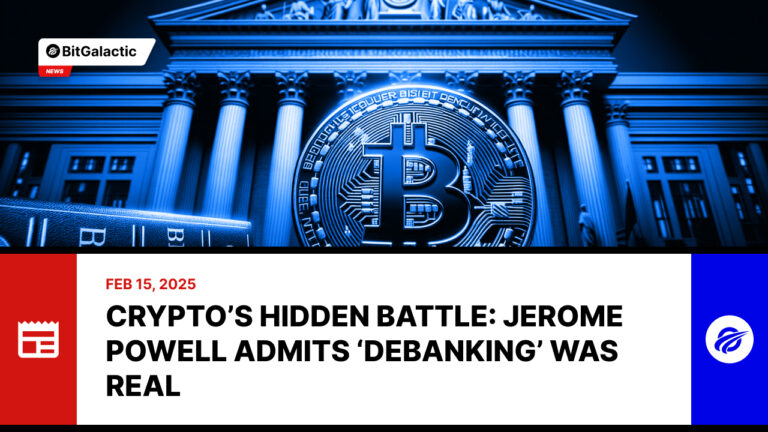Crypto’s Hidden Battle: Jerome Powell Admits ‘Debanking’ Was Real.
Crypto companies were likely “debanked,” Federal Reserve Chair Jerome Powell admitted in a congressional hearing this week. This acknowledgment adds fuel to long-standing industry allegations that regulatory bodies, under the Biden administration, discouraged banks from serving crypto businesses, pushing them offshore.
A Long-Simmering Issue Reaches a Boil
Industry stakeholders have accused regulators of systematically denying basic financial services—like checking accounts—to crypto firms. Powell’s remarks to the House Financial Services Committee suggested these concerns weren’t unfounded.
“We’re all struck at the number of complaints and the breadth of them,” Powell said. “At least some of it is real. We need to understand it and stop it from happening.”
His statement marks a critical moment in the broader regulatory debate, as former President Donald Trump has pledged to turn the U.S. into the “crypto capital of the planet.” Several newly elected lawmakers, including Senator Tim Scott and Representative French Hill, have expressed support for investigating the issue. Even Securities and Exchange Commission Commissioner Hester Peirce has indicated that crypto firms have faced unfair treatment.
Crypto Critics Push Back
Not everyone is convinced that debanking was deliberate suppression. Critics argue that banks were merely protecting themselves from crypto’s volatility and regulatory uncertainties. Powell himself denied any explicit pressure from the Fed to discourage banks from working with crypto clients.
“In Fed-regulated banks, there are lots of crypto activities happening now,” Powell noted. “We’re not telling banks they can’t bank certain people from certain industries.”
But the Federal Reserve isn’t the only regulator under scrutiny. The Federal Deposit Insurance Corporation (FDIC) and the Office of the Comptroller of the Currency (OCC) have also been accused of discouraging banks from servicing the industry.
A ‘Show of Hands’ Moment
Crypto entrepreneurs have frequently voiced their struggles with banking access. Nathan McCauley, CEO and co-founder of Anchorage Digital Bank, shared a telling anecdote:
“I was speaking at a meetup of about 100 crypto founders in San Francisco,” he said. “As a show of hands, I asked, ‘Who here has had trouble getting an account or with debanking?’ All of the hands in the room went up.”
BitGalactic’s Perspective: The Bigger Picture
From BitGalactic’s perspective, this is not just about crypto—it’s about financial freedom. The ability to access banking services is a fundamental right in the modern economy. If regulators and banks are selectively restricting access, it raises concerns about broader financial censorship.
This issue isn’t new. Crypto investor Nic Carter first raised alarms in early 2023, linking increased scrutiny of crypto-friendly banks to the collapse of FTX. Regulatory statements at the time emphasized preventing crypto’s risks from migrating into the banking system. However, these reassurances did little to quell concerns.
The debate gained further momentum in November when influential venture capitalist Marc Andreessen discussed the issue on Joe Rogan’s podcast.
“This has been happening to all the crypto entrepreneurs in the last four years,” Andreessen said.
The Path Forward
With Powell admitting that at least some debanking concerns are legitimate, the question now is what action regulators will take. Will they implement measures to ensure fair access to banking for crypto firms, or will the industry continue to struggle against a system that remains skeptical of its legitimacy?
The crypto community, and the financial world at large, will be watching closely.
Bitcoin’s Imminent Breakout? Experts Predict a Major Rally is Near
Bitcoin has been trading sideways for months, but many analysts believe a major breakout is just around the corner.
Macroeconomic improvements and shifting U.S. policies under Donald Trump are expected to be key drivers. However, that’s not the only catalyst. Leading experts—including Standard Chartered’s Geoff Kendrick, Maelstrom’s Arthur Hayes, and BlackRock CEO Larry Fink—have weighed in on where Bitcoin is heading next.
Standard Chartered’s Geoff Kendrick: $102,500 Target
Geoff Kendrick, the global head of digital assets research at Standard Chartered, expects Bitcoin to reach $102,500 soon. He attributes this outlook to political sentiment, macroeconomic factors, and improving risk conditions.
“We may be finally moving from bad Trump to good Trump as far as risk assets are concerned,” Kendrick noted in a February 13 update.
Other drivers include:
- A potential resolution to the Ukraine conflict easing global uncertainty.
- Bitcoin’s resilience despite strong U.S. inflation data.
- A steeper yield curve supported by higher term premiums.
Maelstrom’s Arthur Hayes: Watching TRUMP Memecoin
Arthur Hayes, CIO of Maelstrom, is tracking Bitcoin’s movements in relation to Trump’s memecoin, $TRUMP.
“Trump checks the $TRUMP price as often as he checks the level of the S&P 500,” Hayes said in a recent blog post.
He pointed out that $TRUMP is down 80% from its highs, and Bitcoin has yet to reclaim the $110,000 level reached during the peak of $TRUMP mania. According to Hayes, if insiders expect positive crypto policies, $TRUMP will surge before the official announcement—Bitcoin will follow.
BlackRock’s Larry Fink: Bitcoin at a Sovereign Level
BlackRock, the world’s largest asset manager, sees sovereign wealth funds considering Bitcoin allocations between 2% and 5%.
“If everyone adopted that conversation, it would be $500,000, $600,000, $700,000 per Bitcoin,” Fink said at the World Economic Forum.
Share this post


